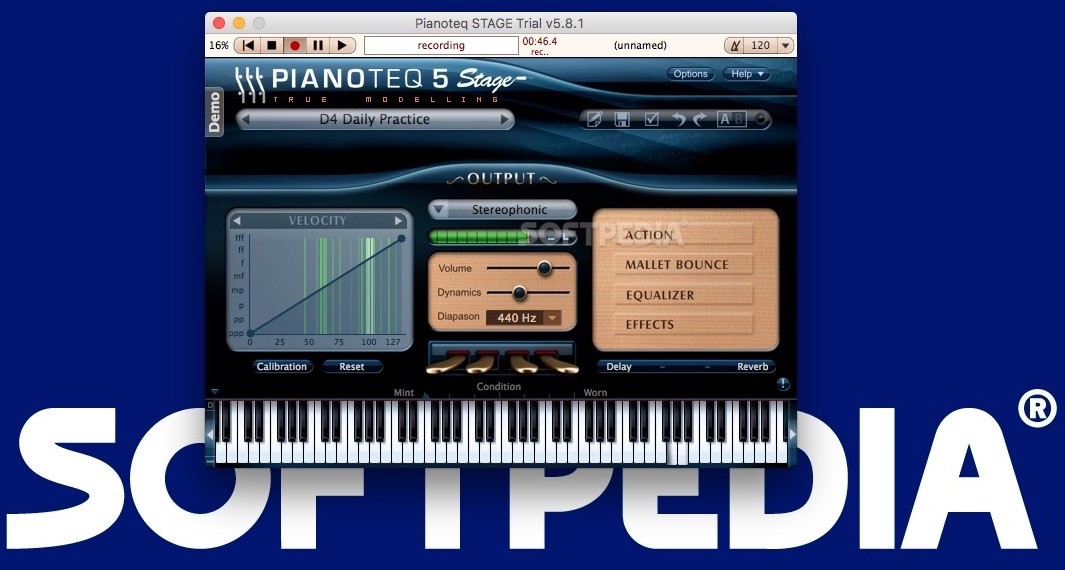

Using 32-bit internal computation, the calculated piano sound is free from quantization noise. True dynamic timbre results, from the faintest pianissimo to the strongest fortissimo, for all 127 standard MIDI velocities (and even more with high resolution MIDI).Įverything that characterizes a real piano is there: the mechanical noises, the complex sound of pedals and strings in interaction, the percussive impact on staccato play (short notes), and of course, most importantly, the beauty of the piano sound. The second generation brought innovative sounds (such as the Fender Rhodes, Wurlitzer, Yamaha CP 80, and others), whereas the third generation only reproduced recorded samples. Based on an effective physical model, Pianoteq allows you to adjust and stretch parameters, resulting in new sounds and performance styles. Pianoteq is both away to emulate existing pianos and an innovative tool for music creation.

Pianoteq is in fact the first virtual piano factory: it can produce new brands as well as copies of existing instruments, from historical instruments such as harpsichords and pianofortes to contemporary grand pianos or the more recent electro-acoustic pianos. Other instruments of the idiophones family are regularly added to the Pianoteq collection. Visit our website and discover our latest creations.
Modartt pianoteq 5 how to#
I’m now researching how to build a Raspberry Pi based thing so I can have a headless version of this running so I don’t have to use my laptop.Īnyway, sorry about all the gushing and the massive wall of text, I’m just so excited I had to tell someone and this seems like a really friendly and welcoming place so I decided to dump out all my thoughts right here! Now when I go back to the stock piano it’s just not the same, there’s a clear limitation with how they did the sampling, for instance it feels gimped when I play super duper soft or really really hard, like it’s compressed, and I get a sense of the various thresholds when it switches between various samples, whereas with Pianoteq it’s so organic feeling, I just can’t go back. Of course stock it’s using samples and they sound really good, but to my ears Pianoteq is just as good and maybe better sound-wise, but even being a complete beginner I can 100% feel the difference in playability.
Modartt pianoteq 5 full#
I have a pretty nice (to me) hybrid with real full length grand piano keys, so I decided to hook up my laptop to see how it felt on a “real” piano (well much more real than my MIDI keyboard) and it’s a COMPLETELY different instrument with Pianoteq! I can’t even describe how much better it is. What I can’t get over is the playability. Within the context of a mix it’s basically impossible for my (albeit aging) ears to detect that it’s not sampled. I absolutely cannot believe what can be achieved through modeling and synthesis these days! It’s still not yet 100% perfect so there’s a little room to grow, but it’s WAAAAAY closer than I imagined. I have a MIDI keyboard set up in my living room with some nice speakers and an HTPC and growing tired of massive multi-hundred GB sample libraries, longer load times, etc I decided to take a peak at what’s out there and came across Pianoteq and I’m completely blown away! I do a little of amateur music production/mixing so I’ve done plenty of tinkering around with various piano plugins over the years, almost all being sample-based, and for some reason didn’t really even consider a non-sample based piano plugin because I figured all would sound way too fake. I just purchased this last night and I have to say that I can’t get enough of this thing! For a little context, I’ve been playing bass for about 30 years and once I hit 40 I decided that I need to branch out and learn a chordal instrument for real (was a tinkerer before) so I started taking up piano (only been playing for about a year and a half). I just found this community by googling everything Pianoteq and this seems like a really nice little corner of the internet!


 0 kommentar(er)
0 kommentar(er)
